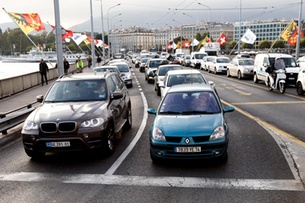Traffic jam in Geneva: bad for the environment, bad for the nation's wallet. (Keystone) - Click to enlarge A government study has found that the so-called ‘external costs’ of various modes of transport collectively increased by almost CHF1 billion during the period 2010-2015. For walkers and cyclists, however, benefits outweigh the costs. The study, published on Thursdayexternal link by the Federal Office for Spatial Development (FOSD), analysed various forms of transport to calculate their “external costs”: not the obvious ones like fuel or a train ticket, but rather the indirect ones, such as environmental damage or health problems caused by an accident. Such costs, which often fall to third parties or public
Topics:
Swissinfo considers the following as important: 3) Swiss Markets and News, Business, Featured, newsletter
This could be interesting, too:
Nachrichten Ticker - www.finanzen.ch writes Die Performance der Kryptowährungen in KW 9: Das hat sich bei Bitcoin, Ether & Co. getan
Nachrichten Ticker - www.finanzen.ch writes Wer verbirgt sich hinter der Ethereum-Technologie?
Martin Hartmann writes Eine Analyse nach den Lehren von Milton Friedman
Marc Chandler writes March 2025 Monthly

Traffic jam in Geneva: bad for the environment, bad for the nation's wallet. (Keystone) - Click to enlarge
A government study has found that the so-called ‘external costs’ of various modes of transport collectively increased by almost CHF1 billion during the period 2010-2015. For walkers and cyclists, however, benefits outweigh the costs.
The study, published on Thursdayexternal link by the Federal Office for Spatial Development (FOSD), analysed various forms of transport to calculate their “external costs”: not the obvious ones like fuel or a train ticket, but rather the indirect ones, such as environmental damage or health problems caused by an accident.
Such costs, which often fall to third parties or public services to pay, increased from CHF12 billion ($12.1 billion) to CHF12.8 billion between 2010 and 2015, the report stated.
The rise can mostly be explained by increased traffic on Swiss roads, a rising population, and a greater number of buildings exposed to noise and other pollution caused by transport.
+ Read more in detail about how Swiss people get around
At some CHF9.2 billion, road traffic brings the biggest indirect bill of all forms of transport. This is mainly due to environmental pollution, noise, and work-time lost due to traffic jams, the report found.
Elsewhere, air travel racked up a CHF1.2 billion negative balance (mainly due to large CO2 emissions), with rail responsible for CHF1.1 billion.
And while non-motorised forms of transport such as walking and cycling also come at a cost – some CHF950 million, mainly due to accidents – the overall balance is positive once the health benefits of increased activity are factored, the report found.
Naturally such estimations are difficult to come by; the FOSD’s study relied on an interdisciplinary approach that included input from medical researchers, environmental experts, and financial statisticians who calculated how much a human life is economically worth (some CHF230,000 annually, for this report).
SDA-ATS/dosTags: Business,Featured,newsletter
